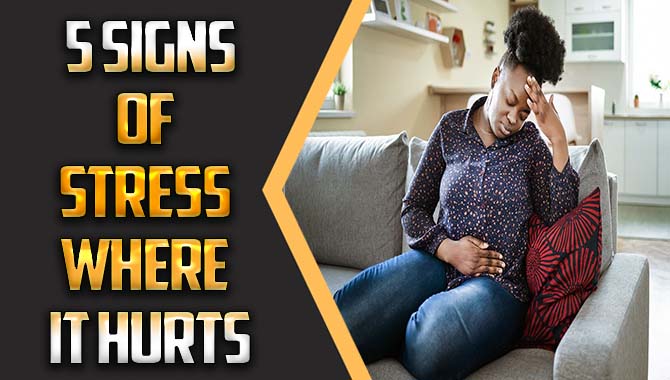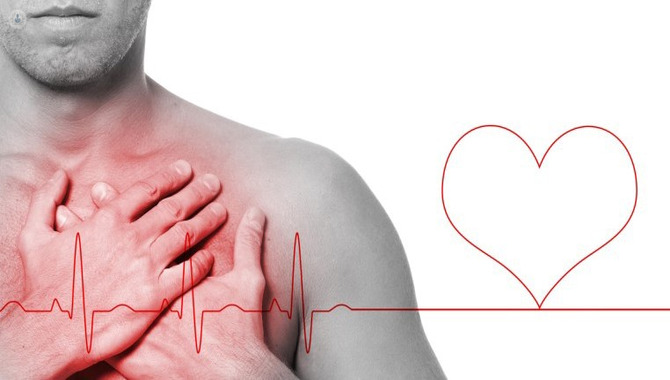Stress is a mental and emotional state that can negatively impact your health. Signs of stress include feeling tense, anxious, or irritable. These symptoms may indicate you’re experiencing chronic stress, characterized by negative emotional and physical symptoms such as headaches, difficulty sleeping, and weight gain.
The pressure of everyday life can be overwhelming. It’s easy to feel stressed when you have too much to do. Too much to think about or too many responsibilities. But stress isn’t always obvious in the form of heart palpitations or headaches. It can also show up in small physical symptoms that make us feel out of balance and out of sorts.
What are the signs of stress where it hurts that may be telling you your body is under too much pressure? And how can you help relieve stress and improve your overall health? Read this article to find out.

5 Signs Of Stress Where It Hurts, And How To Reduce It

Stress is an unavoidable part of life. But too much of it can lead to health problems, such as headaches, insomnia, weight gain/loss, digestive problems, and a racing heart. You can reduce stress levels by doing activities that calm you, such as yoga or meditation. Additionally, you can address the root cause of your stress using techniques like breathing exercises or mindfulness practices. These are effective ways to relieve stress and improve your mental health.
1.Headaches Or Dizziness

When you’re under stress, your body responds by producing more of the hormone cortisol. This hormone plays an important role in helping you cope with stress and health by boosting your immune system and regulating blood sugar levels. However, too much cortisol can lead to headaches, dizziness, and fatigue. This is why it’s important to reduce stress and relieve these symptoms. Besides, there are several ways to reduce your stress level and relieve symptoms of stress.
You can try relaxation techniques such as yoga, meditation, or aromatherapy. Alternatively, you can speak to your doctor about medication options that may be more suited to your specific situation. In any case, it’s important to manage stress and ensure your health and well-being.
2.Muscle Tension Or Pain

Tight muscles, or muscle tension, are common signs of stress and can be solved by simple steps. One way to relieve muscle tension is by massaging your neck, shoulders, and back. Massage also helps to improve circulation and reduce inflammation, two effects that can help improve your overall health.
Besides, yoga classes can help you relax your body and mind. A hot bath can soothe your skin and reduce inflammation. Alternatively, you can try cognitive behavioral therapy (CBT) to change how you think about stress. You can reduce stress and improve your well-being by taking some time for yourself and addressing your physical and mental health concerns.
3.Stomach Problems

Stress can cause a wide range of health problems, including stomach problems. When experiencing stress, it’s easy to become stressed out, worried, and emotional. This can make you feel physically ill, leading to nausea, diarrhea, or heartburn.
If you are experiencing any of these signs of stress, consult your doctor. In some cases, stress-related stomach problems may be reversible if you take steps to reduce stress and improve your overall health. Simple steps to relieve stress include getting enough sleep, exercising regularly, and eating a healthy diet.
Additionally, try learning to relax and cope with stress in other ways. If you are experiencing any signs of stress in your stomach, consult your doctor immediately for help finding a solution.
4.Chest Pain Or A Faster Heartbeat

Expert stress can lead to chest pain or a faster heart rate. If you’re experiencing any of these symptoms, take a step back and relax. Try to reduce your stress levels by taking time for yourself, exercising, and engaging in hobbies. Additionally, if you’re feeling overwhelmed with schoolwork or pained by chronic pain, seek professional help.
A faster heart rate can also signify stress if it occurs without any identifiable physical cause. This indicates that your body is stressed and trying to compensate for it. However, the best way to reduce stress is by taking steps to reduce the sources of stress in your life.
5.Sexual Problems

It’s common for sexual problems to be a sign of stress or anxiety. If you’re experiencing any of these symptoms, it may be time to seek help from your doctor. Sexual problems can range from mild to severe and often have physical and emotional causes.
They may be linked to past traumatic experiences, such as sexual abuse or rape, and mental health issues, such as depression or anxiety. In some cases, sexual problems are irreversible and may require professional assistance. If you are struggling with sexual problems, talk to your healthcare provider about ways to cope and heal.
8 Simple Ways To Reduce The Pressure Of Everyday Life

Stress can take a serious toll on your health and well-being. To reduce the pressure of everyday life, try getting enough exercise. A world filled with physical activity is healthier and happier, after all. Also, connect with family and friends. Spending time with loved ones lets you destress and enjoy quality time. This helps strengthen relationships and reduces stress.
1.Reducing Stress Through Relaxation And Meditation
Reducing stress is a key part of maintaining good mental and physical health. Finding ways to relax and destress is important, such as taking a bath or meditation. Many different methods of relaxation and meditation can help people achieve this goal.
Some simple stress-reducing tips include practicing yoga or meditation, walking outdoors, or reading a book. Incorporating these practices into your daily routine can help you feel more relaxed and in control.
2.Improving Sleep Habits
Sleep is vital for health and well-being. Poor sleep habits can lead to several health problems, including anxiety and depression. It’s important to improve your sleep habits and establish a regular bedtime routine for your physical and mental health. Reducing noise levels in your bedroom, avoiding caffeine and alcohol before bedtime, and exercising regularly are some basic changes you can make to improve your sleep quality.
In addition to these steps, consider creating a relaxing bedtime ritual that reduces stress and anxiety. Besides, sticking to a regular sleeping schedule will help you fall asleep faster and sleep better. Investing time in improving your sleep habits is essential for overall health and well-being.
3.Engaging In Physical Activity
Physical activity is a great way to reduce stress and improve mood. In addition to reducing stress, physical activity can also boost your self-confidence and make you feel more productive. Regular physical activity can also improve sleep quality and reduce anxiety.
If you are looking for ways to reduce the pressure of everyday life, engaging in physical activity is a great option. Whether it’s going for a walk, doing yoga, or working out at the gym, physical activity can help reduce the stress hormone cortisol and improve mood. So why not try some physical activity today and see the benefits for yourself?
4.Managing Food Intake
Reducing stress levels is vital to improving overall health. To reduce stress, it’s important to manage food intake and stay consistent with a healthy diet and exercise routine. It’s also important to avoid eating too much or eating junk food, which can lead to increased stress levels.
One effective way of reducing stress is by slowing down and enjoying each bite of your meal, so take time to savor your food. Additionally, it’s important to manage your stress levels by finding ways to relax and destress, such as meditation or exercising regularly. Taking these steps can reduce stress and improve your health in many ways.
5.Limit Caffeine And Alcohol Intake
It is important to limit your caffeine and alcohol intake if you want to stay centered and stress-free. Caffeine and alcohol both have the potential to cause stress, so it’s important to keep them to a minimum if you want to avoid feeling overwhelmed and stressed.
To stay stress-free, it’s also helpful to take a break every now and then to relax and rejuvenate yourself. Whether it’s taking a walk or spending time with friends and family, these types of activities are good ways of relieving pressure and stress. Besides,
it is essential that you get enough sleep to restore energy and calm the mind. By sleeping well, you can help reduce stress levels in your everyday life.
Besides, meditation or yoga can be great ways of destressing and calming the mind. By practicing this type of exercise, you can center yourself and regain a sense of balance and peace in your life.
6.Exercise Regularly
Regular exercise can have a significant impact on mental and physical health. It has been demonstrated that regular exercise can help reduce stress and improve moods. Exercise releases endorphins, which are hormones that promote happiness and relaxation.
Besides this, regular exercise can also help improve cognitive function and overall physical health. There are a variety of different types of exercise that are suitable for reducing stress, including cardio exercises, strength training, and yoga. Simply incorporating some form of exercise into your daily routine can have a significant impact on your mental and physical health.
7.Find A Hobby Or Passion For Focusing On
Stress can have a negative impact on your physical health in a number of ways. It can cause physical symptoms, such as headaches and stomach pain. In addition, stressed individuals are more likely to suffer from mental health issues, such as anxiety and depression.
It’s important to find a hobby or passion that you can commit to reducing the pressure of everyday life. This will give you something to focus on and take control of your own life. By finding a hobby or passion that you truly enjoy, you’ll be able to reduce stress in your life and enjoy yourself more.
8.Connect With Loved Ones
When you’re under stress, it can be hard to focus on anything else besides the stressors in your life. Reducing the amount of stress in your life can help you feel better mentally and physically. There are a number of ways you can reduce the pressure of everyday life and connect with loved ones.
Talking to your loved ones about what stresses you out and seeing if they have any advice or suggestions can be a helpful way to reduce stress in your life. Taking a break from your daily routine to focus on yourself and relax can be an effective way to reduce stress. Additionally, cultivating a positive mindset by focusing on things that make you happy and remembering why you’re fighting the good fight can be vital in reducing stress in your life.
Conclusion
Stress-related symptoms can range from mild, such as headaches and trouble sleeping, to more severe problems, such as chest pain or heart attack. Although stress affects people in a variety of ways, there are some things you can do to manage the symptoms. Reduce stress by doing something fun or relaxing, like meditation or yoga. If you’re feeling stressed out, spend time with family and friends.
Some of the strategies for managing stress include exercise, relaxation techniques, and positive thinking. Also, seeking help from a mental health professional can provide valuable guidance and support to effectively address the cause of chronic stress and its symptoms.
If you are experiencing signs of chronic stress that are causing significant problems in your life, it is important to seek help as soon as possible. If you find this blog helpful signs of stress where it hurts, please share it with your friends and family members who might benefit from its advice. Together, we can help people struggling with stress find relief and understanding.
Frequently Asked Questions:
1.Where Do You Feel Pain From Stress?
Ans. Stress can cause pain in many different parts of the body. Here are some of the more common places where you may experience symptoms:
- Headache:
- Backache:
- Arthritis:
- Rheumatoid arthritis:
2.What Are The 7 Physical Signs Of Stress?
Ans. 7 physical signs of stress are:
- Muscle tension:
- Headache:
- Dry mouth:
- Lack of energy
- Poor sleep:
- Anxiety symptoms:
- Social withdrawal:
3.What Are The 5 Signs That You Are Experiencing Stress?
In order to help you identify when you are experiencing stress, here are five signs that you should take note of:
- You may experience tension headaches, muscle pain, insomnia, increased heart rate, and an increased appetite.
- Your mental health may start to suffer- you may become more irritable or reckless with your actions.
- You may find it harder to concentrate or make decisions.
- You may start to avoid social engagements because of feeling overwhelmed or uncomfortable.
- You may experience physical symptoms like joint pain, digestive problems, and hair loss.
4.What Does Extreme Stress Do To The Body?
Ans. When people experience extreme stress, it can cause physical pain. This pain can lead to increased levels of cortisol and other hormones in the body. Cortisol is a hormone that is released in response to stress and can have negative long-term effects on the body.
These effects may include problems with weight control, diabetes, hypertension, heart disease, and more. It’s important to find ways to cope with stress in a healthy way so that you don’t suffer long-term health consequences as a result.
5.How Can I Deal With Stress When It Becomes Overwhelming?
Ans. When stress becomes overwhelming, one of the best ways to deal with it is by making a list of 5 stress-relieving activities that you enjoy. This could include things like spending time with friends and family, getting outdoors for a walk or run, practicing yoga or meditation, reading or listening to your favorite music, or taking a bath.
In addition, make sure to exercise regularly and get enough sleep. Both of these activities can help reduce stress levels and improve your overall mood. Finally, take time for yourself every day to do something that makes you happy and allows you to relax.

Leave a Reply